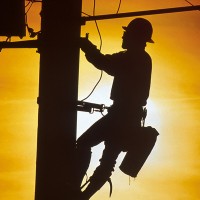Electrician
An electrician is a tradesperson who specializes in the electrical wiring of machines and buildings. Regardless of where you live, you will be able to find steady work as an electrician. As long as electricity remains a vital part of our society, there will be a high demand for skilled electricians. While it takes years of studying and practice to become a skilled electrician, it is worth the effort.
Education
 While you do not need a college degree to become an electrician, you do need formal training. Typically this is completed at a technical school after you have completed high school; although in some cases you may be able to include the technical training as part of your high school curriculum. Vocational schools and community colleges typically offer electrician training programs in the form of apprenticeships. In the classroom, apprentices will learn mathematics, electrical theory, electrical codes, blueprint reading, and safety and first aid. There is usually a minimum of 144 hours of classroom time per year. There is also 2000 hours of on the job training per year, where apprentices are supervised by experienced electricians, beginning with simple tasks and eventually progressing towards more complex tasks. The following schools (https://www.midsouthiec.org/appele.htm and https://www.calapprenticeship.org/programs/electrician_apprenticeship.php) are two examples of electrician programs offered in the United States. After completing the apprenticeship, electricians need to get licensed, which usually requires passing an examination of questions on electrical theory and electric building codes. Electricians can also acquire a Master Electrician license, which allows them to work as contractors. This typically requires a minimum of 7 years experience however, and sometimes even a bachelor’s degree in electrical engineering.
While you do not need a college degree to become an electrician, you do need formal training. Typically this is completed at a technical school after you have completed high school; although in some cases you may be able to include the technical training as part of your high school curriculum. Vocational schools and community colleges typically offer electrician training programs in the form of apprenticeships. In the classroom, apprentices will learn mathematics, electrical theory, electrical codes, blueprint reading, and safety and first aid. There is usually a minimum of 144 hours of classroom time per year. There is also 2000 hours of on the job training per year, where apprentices are supervised by experienced electricians, beginning with simple tasks and eventually progressing towards more complex tasks. The following schools (https://www.midsouthiec.org/appele.htm and https://www.calapprenticeship.org/programs/electrician_apprenticeship.php) are two examples of electrician programs offered in the United States. After completing the apprenticeship, electricians need to get licensed, which usually requires passing an examination of questions on electrical theory and electric building codes. Electricians can also acquire a Master Electrician license, which allows them to work as contractors. This typically requires a minimum of 7 years experience however, and sometimes even a bachelor’s degree in electrical engineering.
Job Description
 As an electrician, you will be required to install, test, connect, and maintain electrical systems. This may be for a variety of purposes, including security and climate control. You will have to work with blueprints when installing electrical systems in office buildings, factories, and homes. Electricians have to connect wires to transformers, circuit breakers, and other components before joining these wires with specially designed connectors. After the wiring is complete, it needs to be tested with specific equipment to ensure the circuits are properly connected and are safe at the same time. General maintenance work varies depending on where the electrician works. Those who specialize in large factories may be required to repair generators, motors, and machine tools, while those who work in residences may have to rewire a home or replace an old fuse box. These are just some of the many duties an electrician may perform in a day.
As an electrician, you will be required to install, test, connect, and maintain electrical systems. This may be for a variety of purposes, including security and climate control. You will have to work with blueprints when installing electrical systems in office buildings, factories, and homes. Electricians have to connect wires to transformers, circuit breakers, and other components before joining these wires with specially designed connectors. After the wiring is complete, it needs to be tested with specific equipment to ensure the circuits are properly connected and are safe at the same time. General maintenance work varies depending on where the electrician works. Those who specialize in large factories may be required to repair generators, motors, and machine tools, while those who work in residences may have to rewire a home or replace an old fuse box. These are just some of the many duties an electrician may perform in a day.
Pros & Cons
Like any job, there are both advantages and disadvantages to being an electrician. A college degree is not necessary. By going through an apprenticeship program instead, you get to learn from a trained professional and make money while you are training. Electricians also make solid wages when compared to other professions. According to the Bureau of Labor Statistics, electricians make an average of $24 per hour, and also have the ability to work overtime hours on big jobs. There is also consistent work, even in a struggling economy, as electricity is vital to society and thus electricians will always be in high demand. Most electricians work independently, meaning you can make your own schedule taking only the jobs you choose. However, most electricians must work on call, meaning they may have to work weekends or holidays. Most electrical problems need to be fixed immediately and cannot wait. Electricians also have to work in cramped and uncomfortable surroundings. The biggest disadvantage however, is electricity is very dangerous and can be fatal, and thus electricians must be extra careful with everything they do while on the job.

